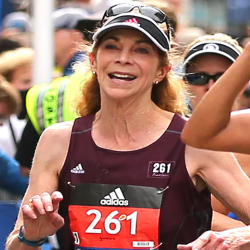
Kathrine Switzer
| Date of Birth | : | 05 Jan, 1947 |
| Place of Birth | : | Amberg, Germany |
| Profession | : | Marathon Runner, Author |
| Nationality | : | American |
| Social Profiles | : |
Facebook
Twitter
Instagram
|
Kathrine Virginia Switzer is an American marathon runner, author, and television commentator. In the year 1967 she became the first woman to run the Boston Marathon as an officially registered competitor.
Life and career
Switzer was born in Amberg, American-occupied zone of Germany, the daughter of a major in the United States Army. Her family returned to the United States in 1949. She graduated from George C. Marshall High School in Fairfax County, Virginia, then attended Lynchburg College. She transferred to Syracuse University in 1967, where she studied journalism and English literature. She earned a bachelor's degree there in 1968 and a master's degree in 1972.
1967 training
After transferring from Lynchburg to Syracuse, Switzer sought permission to train with the men's cross-country running program. Permission was granted, and cross-country assistant coach Arnie Briggs began training with her. Briggs insisted a marathon was too far for a "fragile woman" to run, but he conceded to Switzer: "If any woman could do it, you could, but you would have to prove it to me. If you ran the distance in practice, I’d be the first to take you to Boston." By the winter of 1967, Switzer was training for the upcoming Boston Marathon, tackling courses in Syracuse and on the roads between Syracuse and Cazenovia, New York, 20 miles away.
1967 Boston Marathon
The rule book for the Boston Marathon made no mention of gender. The AAU, which governed the Marathon, declared that women could not compete in AAU-sanctioned races over a mile and a half.
This exclusion of women from a premier athletic event was already drawing high-profile challenges. In 1966, Bobbi Gibb had tried to enter the race officially but had been rejected by BAA Director Will Cloney who claimed women were physiologically incapable of running 26 miles. Gibb completed the 1966 race ahead of two-thirds of the runners with a time of 3:21:40, having entered the course near the starting pen in the middle of the pack. But Gibb was not an official entrant.
Personal life
In 1968, Switzer married Tom Miller, the man who had put an end to Semple's attack in 1967. They divorced in 1973. Switzer subsequently married and divorced public relations executive Philip Schaub. She then married British-born New Zealand runner and author Roger Robinson in 1987.
Switzer eventually made amends with Semple after he changed his mind with regard to women in sports. The two became close friends, and she last visited him shortly before Semple's death in 1988.
Quotes
I don't have any kids of my own, quite by choice. There are two reasons for that. One, I had a sense of obligation for what my life would be and a vision of how to get that accomplished and it didn't include children. It's not that I don't like them, it's just that if you have them, they deserve 100 per cent of your attention.
Jock Semple and I were at daggers drawn for five years, even though I kind of forgave him from the get-go. I knew he was an over-stressed race director, I knew he was protecting his race. It took five years because we had to do our homework - meaning we women - we did our legislative work and we officially got into the Boston Marathon. Then, all was forgiven by Jock Semple.
Five years after Boston 1967, I went to the Munich Olympics. I realized that major sponsorship could help me create the opportunity. I wrote a big proposal to Avon cosmetics on how creating a global series of women's races could lead to getting women in the Olympic marathon. People thought I was smoking poppy at the time. The longest event in the Olympic Games was 800m.
When I forgave Jock Semple on Heartbreak Hill, I also got really cross with women. I couldn't understand why they didn't get it, why they didn't know that running was so cool and why they weren't in the race as well. Then I thought to myself "How stupid can you be? You've had so much encouragement and motivation and these women haven't."
A picture, of Jock Semple kissed me,appeared in The New York Times the next day after Boston Marathon in 1973, and the caption was "The end of an era.
